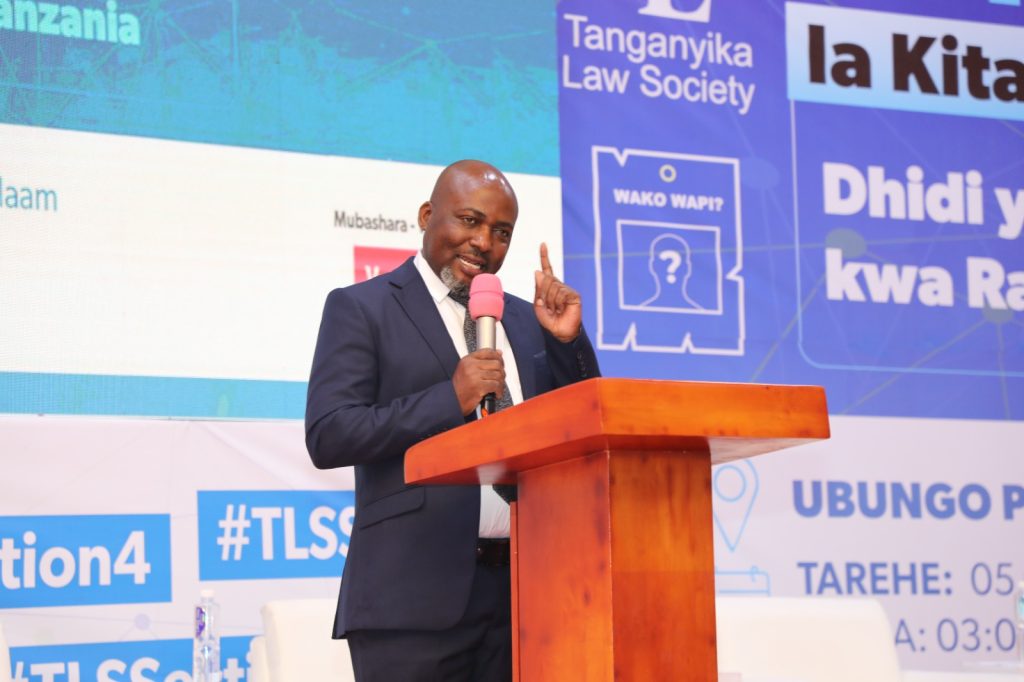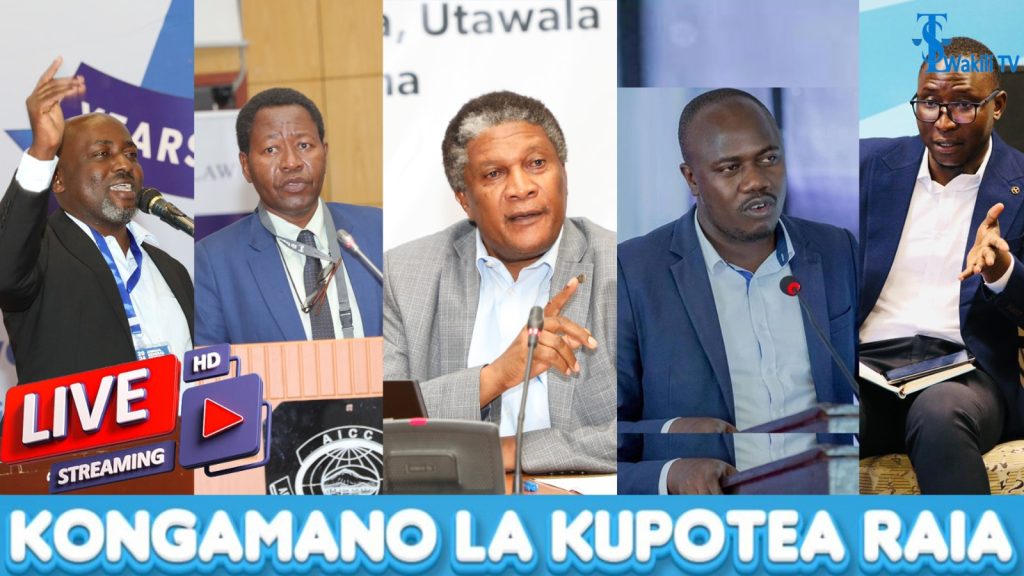Dar es Salaam, Tanzania – On October 5, 2024, the Tanganyika Law Society (TLS) hosted a crucial symposium addressing the worrying rise in enforced disappearances, torture, and even murders of government critics.
The event in Dar es Salaam brought together prominent lawyers, human rights advocates, civil society leaders, and political figures to deliberate on these alarming trends and discuss their impact on Tanzania’s democratic future.
The symposium highlighted key challenges facing the nation as it struggles to balance promises of reform with a concerning slide towards authoritarian tendencies.
The Growing Threat to Civil Liberties
The discussions began with sombre presentations from human rights activists, who painted a grim picture of Tanzania’s current human rights climate.
Speakers presented documented evidence of rising enforced disappearances, brutal treatment of detained critics, and extrajudicial killings targeting opposition figures, journalists, and activists.
The symposium underscored that these cases are not isolated incidents but appear to be part of a broader pattern of suppression.
One prominent case discussed was that of Abubakar Songolo, who was illegally arrested by the police in August and has since disappeared without a trace.
His parents, who were present at the symposium, spoke emotionally of their missing son. Songolo’s mother described their family’s anguish as they repeatedly attempted to gain information from the authorities, only to be silent. “We just want to know if our son is alive or dead.
READ RELATED: Why Do We See Abductions, Disappearances, And Killings of Government Critics in Tanzania Today?
We need answers,” she pleaded, her voice cracking with emotion. The story of Abubakar Songolo exemplified the lack of transparency and accountability that has come to define these disappearances, casting a dark shadow over Tanzania’s human rights record.

More Notable Cases of Enforced Disappearances
The symposium also highlighted several other notable cases of abductions and enforced disappearances, including those of Ali Kibao, Deusdedith Soka, and Sativa.
- Ali Kibao, a senior member of the CHADEMA central committee, was not known for being vocal in public forums but was widely regarded as an important political strategist for the party.
-He was kidnapped in July 2024 while travelling on a passenger bus from Dar es Salaam to Tanga. Kibao was forcibly removed from the bus by individuals who identified themselves as police officers. Days later, his body was discovered in Dar es Salaam, showing signs of violence.
-The chilling nature of this case, where a key party strategist was abducted in public and later found dead, has raised serious concerns about the targeting of opposition figures and the abuse of state power.
– Kibao’s death sent shockwaves through the CHADEMA party, with leaders and supporters calling it a deliberate attack on the democratic process and a clear attempt to stifle political strategy and opposition leadership.
- Deusdedith Soka, a youth wing leader for CHADEMA in Temeke District, Dar es Salaam, was another prominent case discussed during the symposium.
-Soka, known for his outspoken criticism of government policies and active role in mobilizing young people to support constitutional and democratic reforms, disappeared in broad daylight in August 2024.
-Despite multiple pleas to authorities, there has been no meaningful investigation into his disappearance. During the symposium, advocates spoke on behalf of Soka’s family, describing their continued struggle to find answers and the ongoing silence from authorities.
-His disappearance has become emblematic of the risks political activists face in Tanzania, especially those aligned with the opposition.
- Sativa, a well-known social media critic, surprised many attendees by appearing live at the symposium to recount his recent ordeal. Sativa has built a significant following online for his vocal criticism of police brutality and other abuses of power. During the symposium, he spoke about his abduction, describing in vivid detail how he was kidnapped, tortured, and eventually left for dead in Katavi National Park.
-He confirmed that his captors were members of the police force and even mentioned the names of some of those involved. “They beat me, they mocked me, and they left me thinking I would die in the wilderness,” Sativa said, his voice steady despite the chilling account.
-His testimony shocked the audience, as it brought direct evidence of state involvement in these abuses and highlighted the impunity with which certain elements of the police force operate.
-Sativa’s brave statement added weight to the symposium’s calls for accountability and reform, revealing how deeply the problem has become.
Dr. Rugemeleza Nshalla’s Remarks
Dr. Rugemeleza Nshalla, a prominent lawyer and human rights advocate, delivered a powerful address on the broader implications of the rising abuses during the TLS Symposium.
Drawing stark parallels, Dr. Nshalla compared the current wave of enforced disappearances, torture, and murders of government critics in Tanzania to the infamous campaigns of oppression seen in South America during the 1970s.
“What we are seeing here in Tanzania has a disturbing resemblance to the atrocities that took place in Chile, Argentina, and other parts of South America in the 70s,” Nshalla remarked.
During that period, authoritarian regimes across South America systematically used enforced disappearances to silence political opposition and instil fear in the population.
Dr. Nshalla emphasized that this type of state-sanctioned terror undermines not just individual rights but the entire democratic fabric of society.
“This is not just about individual incidents of abductions and torture; it’s about the future of Tanzania’s democracy. When critics and dissenters are silenced through violence, it impacts citizens’ ability to hold the government accountable,” he said.
Nshalla argued that these actions were not just violations of human rights but clear indicators of a deep institutional crisis. He called on the government and the international community to ensure justice.
Professor and Retired Judge Makaramba’s Key Address on Legal Frameworks
One of the symposium’s most anticipated speakers was Professor and retired judge Makaramba, whose address focused on the international and national legal framework concerning enforced disappearances.
Professor Makaramba, a respected figure in the legal and academic communities, emphasized that Tanzania’s obligations under international law, including various treaties and conventions, strictly prohibit enforced disappearances and related abuses.
Nshalla reiterated that enforced disappearances, torture, and extrajudicial killings are not merely isolated violations; they are in direct contravention of multiple international treaties to which Tanzania is a signatory, including the International Convention for the Protection of All Persons from Enforced Disappearance.
He elaborated on how Tanzania’s adherence to these conventions is not only a matter of international image but a foundational aspect of upholding justice and human rights within the country.
The Ostrich Doctrine and Denial in Governance
Makaramba also touched upon the “Ostrich Doctrine, ” seemingly taking root in the government decision-making process. He used the analogy of an ostrich burying its head in the sand to avoid danger, drawing parallels to government officials who ignore or deny the serious issues plaguing the country.
“The Ostrich Doctrine, where officials refuse to acknowledge abuses by pretending that such cases of abuse don’t exist, is not only self-defeating but is a direct impediment to progress,” he argued.
Makaramba emphasized that turning a blind eye to the abuses, such as enforced disappearances and systemic police brutality, would only serve to worsen the crisis and further erode public trust in state institutions.
“Refusing to see the problem does not make it go away. It only deepens the damage to our democracy,” he urged leaders to confront the issues directly rather than deny or downplay their severity.
The Role of Security Officers and Law Enforcement
Makaramba also addressed the role of security officers in these violations, emphasizing the importance of individual accountability within the police force.
He urged security officers not to blindly obey unlawful orders, highlighting that such obedience is unethical and contrary to professional duties under national and international law. “Every officer must remember that following an illegal order does not absolve one of responsibility.
We need ethical security forces who respect the rule of law, not individuals who unquestioningly carry out acts that harm citizens,” Makaramba stated. He stressed that the duty to uphold human rights must always override any political directive that seeks to abuse power.
Makaramba called for immediate reforms within the security sector, describing it as “having uncontrolled power with little accountability.”
He argued that abuses would continue to occur without structural changes, even under leaders who may wish to improve the situation. His suggestion included establishing an independent oversight commission to monitor the conduct of law enforcement agencies and recommend prosecutions for those involved in human rights abuses.
A Call for Accountability and Legal Reform
The TLS used the symposium to call for immediate government action to address these violations. Repeated demands were made for the government to investigate and hold accountable those responsible for these abuses, regardless of their positions of power.
The TLS President Boniphace Mwabukusi emphasized the need for a strong and independent judiciary to address these matters impartially and ensure that justice is not withheld from victims and their families.
Several panellists argued for reforms in the legal and policing systems, focusing on removing the executive’s influence over law enforcement.
Mwabukusi called for reforms that would strengthen existing accountability mechanisms within the police and security forces, including the establishment of an independent oversight body with powers to investigate allegations of police misconduct and enforced disappearances.
What It Means for Tanzania’s Democratic Transition
The TLS symposium did not shy away from the larger implications of these human rights violations on Tanzania’s democratic transition. Participants agreed that while the current government under President Samia Suluhu Hassan has pledged greater openness and dialogue, these ongoing abuses cast serious doubts on these commitments.


Blue Techker naturally like your web site however you need to take a look at the spelling on several of your posts. A number of them are rife with spelling problems and I find it very bothersome to tell the truth on the other hand I will surely come again again.